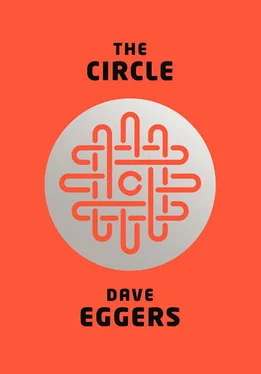The times he would ask her to come in, when he would close his door and sit at the corner of his desk—they were excruciating. Do you know why you’re here? he would ask, like a highway cop who’d pulled her over. Other times, when he was satisfied with whatever work she’d done that day, he did something worse: he praised her. He called her his protégée . He loved the word. He introduced her to visitors this way, saying, “This is my protégée, Mae. She’s pretty sharp, most days”—and here he’d wink at her as if he were a captain and she his first mate, the two of them veterans of many raucous adventures and forever devoted to each other. “If she doesn’t get in her own way, she has a bright future ahead of her here.”
She couldn’t stand it. Every day of that job, the eighteen months she worked there, she wondered if she could really ask Annie for a favor. She’d never been one to ask for something like that, to be rescued, to be lifted. It was a kind of neediness, pushiness —nudginess , her dad called it, something not bred into her. Her parents were quiet people who did not like to be in anyone’s way, quiet and proud people who took nothing from anyone.
And Mae was the same, but that job bent her into something else, into someone who would do anything to leave. It was sickening, all of it. The green cinderblocks. An actual water cooler. Actual punch cards. The actual certificates of merit when someone had done something deemed special. And the hours! Actually nine to five! All of it felt like something from another time, a rightfully forgotten time, and made Mae feel that she was not only wasting her life but that this entire company was wasting life, wasting human potential and holding back the turning of the globe. The cubicle at that place, her cubicle, was the distillation of it all. The low walls around her, meant to facilitate her complete concentration on the work at hand, were lined with burlap, as if any other material might distract her, might allude to more exotic ways of spending her days. And so she’d spent eighteen months in an office where they thought, of all the materials man and nature offered, the one their staff should see, all day and every day, was burlap. A dirty sort of burlap, a less refined form of burlap. A bulk burlap, a poor man’s burlap, a budget burlap. Oh god, she thought, when she left that place she vowed never to see or touch or acknowledge the existence of that material again.
And she did not expect to see it again. How often, outside of the nineteenth century, outside a general store of the nineteenth century, does one encounter burlap? Mae assumed she never would, but then here it was, all around her in this new Circle workspace, and looking at it, smelling its musty smell, her eyes welled up. “Fucking burlap,” she mumbled to herself.
Behind her, she heard a sigh, then a voice: “Now I’m thinking this wasn’t such a good idea.”
Mae turned and found Annie, her hands in fists at her sides, posing like a pouting child. “Fucking burlap,” Annie said, imitating her pout, then burst out laughing. When she was done, she managed, “That was incredible. Thank you so much for that, Mae. I knew you’d hate it, but I wanted to see just how much. I’m sorry you almost cried. Jesus.”
Now Mae looked to Renata, whose hands were raised high in surrender. “Not my idea!” she said. “Annie put me up to it! Don’t hate me!”
Annie sighed with satisfaction. “I had to actually buy that cubicle from Walmart. And the computer! That took me ages to find online. I thought we could just bring that kind of stuff up from the basement or something, but we honestly had nothing on the entire campus ugly and old enough. Oh god, you should have seen your face.”
Mae’s heart was pounding. “You’re such a sicko.”
Annie feigned confusion. “Me? I’m not sick. I’m awesome.”
“I can’t believe you went to that much trouble to upset me.”
“Well, I did. That’s how I got to where I am now. It’s all about planning and it’s all about follow-through.” She gave Mae a salesman’s wink and Mae couldn’t help but laugh. Annie was a lunatic. “Now let’s go. I’m giving you the full tour.”
As Mae followed her, she had to remind herself that Annie had not always been a senior executive at a company like the Circle. There was a time, only four years ago, when Annie was a college student who wore men’s flannel housepants to class, to dinner, on casual dates. Annie was what one of her boyfriends, and there were many, always monogamous, always decent, called a doofus . But she could afford to be. She came from money, generations of money, and was very cute, dimpled and long-lashed, with hair so blond it could only be real. She was known by all as effervescent, seemed incapable of letting anything bother her for more than a few moments. But she was also a doofus. She was gangly, and used her hands wildly, dangerously, when she spoke, and was given to bizarre conversational tangents and strange obsessions—caves, amateur perfumery, doo-wop music. She was friendly with every one of her exes, with every hookup, with every professor (she knew them all personally and sent them gifts). She had been involved in, or ran, most or all of the clubs and causes in college, and yet she’d found time to be committed to her coursework—to everything, really—while also, at any party, being the most likely to embarrass herself to loosen everyone up, the last to leave. The one rational explanation for all this would have been that she did not sleep, but this was not the case. She slept decadently, eight to ten hours a day, could sleep anywhere—on a three-minute car ride, in the filthy booth of an off-campus diner, on anyone’s couch, at any time.
Mae knew this firsthand, having been something of a chauffeur to Annie on long rides, throughout Minnesota and Wisconsin and Iowa, to countless and largely meaningless cross-country contests. Mae had gotten a partial scholarship to run at Carleton, and that’s where she met Annie, who was effortlessly good, two years older, but was only intermittently concerned with whether she, or the team, won or lost. One meet Annie would be deep in it, taunting the opponents, insulting their uniforms or SATs, and the next she’d be wholly uninterested in the outcome but happy to be along for the ride. It was on the long rides, in Annie’s car—which she preferred Mae to drive—that Annie would put her bare feet up or out the window, and would riff on the passing scenery, and would speculate, for hours, on what went on in the bedroom of their coaches, a married couple with matching, almost military, haircuts. Mae laughed at everything Annie said, and it kept Mae’s mind off the meets, where she, unlike Annie, had to win, or at least do well, to justify the subsidy the college had provided her. They would invariably arrive minutes before the meet, with Annie having forgotten what race she was meant to run, or whether she really wanted to run at all.
And so how was this possible, that this scattershot and ridiculous person, who still carried a piece of her childhood blanket around in her pocket, had risen so quickly and high through the Circle? Now she was part of the forty most crucial minds at the company—the Gang of 40—privy to its most secret plans and data. That she could push through the hiring of Mae without breaking a sweat? That she could set it all up within weeks of Mae finally swallowing all pride and making the ask? It was a testament to Annie’s inner will, some mysterious and core sense of destiny. Outwardly, Annie showed no signs of garish ambition, but Mae was sure that there was something within Annie that insisted upon this, that she would have been here, in this position, no matter where she’d come from. If she’d grown up in the Siberian tundra, born blind to shepherds, she still would have arrived here, now.
Читать дальше












